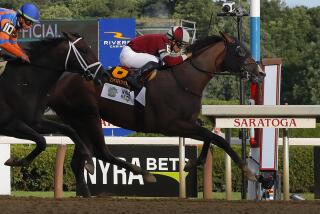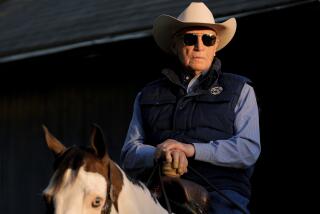Horse Racing : Naysayers Get to Strike Back as Dosage System Strikes Out : Kentucky Derby: Complicated system had not failed for 62 years--until Strike The Gold won Saturday’s race.
- Share via
LOUISVILLE, Ky. — Through the 1980s, the Dosage Index and its cousin, the Center of Distribution, have inspired more gibes than mothers-in-law.
But it was the disciples of dosage and distribution who laughed all the way to the mutuel windows at Churchill Downs. Although they started in 1981 and worked backward, dosage exponents said that no horse had won a Kentucky Derby in 62 years--from 1929 through 1990--without having the right numbers.
No attempt will be made to delineate the numbers here. For the dosage crowd, the givens are that a horse needs an index of 4.00 or lower and a distribution of not over 1.25 to be eligible to win the Derby. Roughly, dosage means going back four generations in the male pedigrees of horses to determine whether they have enough stamina to win at the Derby distance of 1 1/4 miles.
These esoteric gymnastics have prompted some fairly rough comments. “Dosage sounds like something that could be cured with penicillin,” went one crack.
When asked about dosage, Frank (Jimmy) Kilroe from Santa Anita said simply that “figures lie and liars figure.”
Just last week, in The Racing Times, Kent Hollingsworth wrote: “This (dosage) is a canard, an intellectual swindle.”
Through all this, dosage-ophiles could react smugly, swearing by their system, but 1991 may be remembered as year dosage ended, as horseplayers know it, because Strike The Gold won the 117th Kentucky Derby on Saturday and he didn’t have the dosage. His index was 9.00 and his distribution 1.30. Gad.
In front of barn 42 at Churchill Downs early Sunday morning, while Strike The Gold stood contentedly in his stall, none the worse for wear, trainer Nick Zito tried to assess dosage politely. He couldn’t stay polite for very long.
“For the last 100 years, man has been trying to figure out things scientifically,” Zito said. “But racing should be fun. Those racing guys are trying to explain something by bringing in scientific facts, and it’s witchcraft and voodoo. Why should a horse sired by the great Alydar (Strike The Gold) not be capable of getting a mile and a quarter? Three Alydars won races here Saturday.
“This is all silly, and it doesn’t make sense. Big Al’s Express had it (dosage), and Strike The Gold didn’t? I think I need the three wise men to help me with all this.”
Big Al’s Express, who had never run in a race, was vanned about 2,700 miles from Stockton, Calif., to Louisville, the plan being to run in the Kentucky Derby. The dream ended when the colt ran last in the Derby Trial, a week before the Derby.
According to the dosage system, only four horses--Best Pal, Fly So Free, Hansel and Happy Jazz Band--had a right to win the Derby. Hansel went off the betting favorite and finished 10th. Best Pal was second, Fly So Free fifth and Happy Jazz Band 11th.
According to the trainers who have them, a minimum of seven horses have a right to beat Strike The Gold in the Preakness, or otherwise they wouldn’t be sending them to Pimlico to run in the second race of the Triple Crown series on May 18. The list includes Best Pal, Mane Minister (third in the Derby), Corporate Report (ninth), Olympio, Tank, Honor Grades and Near The Limit.
The Preakness field could grow, however, since three candidates--Kyle’s Our Man, Dodge and Subordinated Debt--are running in the Withers at Belmont Park Wednesday. The trainers of Hansel and Fly So Free, the Derby’s fifth- place finisher, didn’t say no to the Preakness Sunday, but they didn’t act as though they would be in Baltimore, either.
Can Strike The Gold win the Triple Crown, which would be worth $5 million? Only three Derby winners--Pleasant Colony, Alysheba and Sunday Silence--have added the Preakness in the past 11 years, and no one has swept the Derby, Preakness and Belmont Stakes since 1978, when Affirmed became the 11th horse to do it.
Generally speaking, Strike The Gold is a late-running, one-run colt who needs to be closer in both the Preakness and the Belmont in order to win those races. At 1 3/16 miles, the Preakness is 110 yards shorter than the Derby, which puts a premium on a quicker turn of foot than is required at Churchill Downs. Strike the Gold was 10th, about 7 1/2 lengths behind the front-running Sea Cadet, at the halfway mark of the Derby. He has run most of his races the way he ran in the Derby, but in the Blue Grass, the Keeneland prep that Strike The Gold won, he was a much closer third in the early going.
The Belmont is deceptive. At 1 1/2 miles, it is easily the longest race in the series, but horses seldom win it coming from far back. Zito and his jockey, Chris Antley, will need to adjust their strategy for both races.
The Preakness will be Strike The Gold’s third tough race in five weeks, a test for any horse. “That’s why they give you $5 million if you sweep,” Zito said. “There’s no free lunch. They want your horse to be whacked out. They don’t want to give all that money away.”
The best fresh horse running in the Preakness is Olympio, who showed two dimensions--early speed and a powerful finishing kick--while winning the Arkansas Derby at Oaklawn Park in his last start. Trainer Ron McAnally didn’t run Olympio in the Kentucky Derby because there were only two weeks between races, but owner Verne Winchell’s colt will go into the Preakness with an extra two weeks.
Olympio has been at Churchill Downs with his stablemate, Sea Cadet, who faded to eighth in the Derby after leading the race for a mile. In fact, Olympio worked six furlongs here Sunday in 1:11. He is the Codex type, a horse like the one who beat Derby winner Genuine Risk off a month’s rest in the 1980 Preakness.
Horse Racing Notes
Green Alligator, fourth in the Kentucky Derby, is scheduled to run in the Belmont on June 8. . . . Quintana, who might have hit the board in the Derby instead of finishing sixth with a terrible trip, is also headed for the Belmont. . . . When Mane Minister ran third at 86-1, it was the best finish by a Derby horse with odds that long since 1913. That year, the winner, Donerail, was 91-1, and the show horse, Gowell, was 87-1.
If there is no Triple Crown winner, the bonus is $1 million for the horse who does the best while running in all three races in the series. The point system has been changed to 10-5-3-1 for finishers in each race, giving more weight to a victory.
Asked about Lewis Burrell’s offer for Strike The Gold after he ran second in the Florida Derby, trainer Nick Zito said: “I was upset when I heard about it, because I didn’t want to lose the horse. There were some negotiations and there was quite a bit of money mentioned, but I think my owners only considered it for about five seconds.” Burrell and his family, including rap star M.C. Hammer, own Lite Light, the Kentucky Oaks winner who ran well enough to have a shot in the Derby.
More to Read
Go beyond the scoreboard
Get the latest on L.A.'s teams in the daily Sports Report newsletter.
You may occasionally receive promotional content from the Los Angeles Times.










